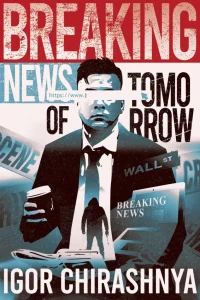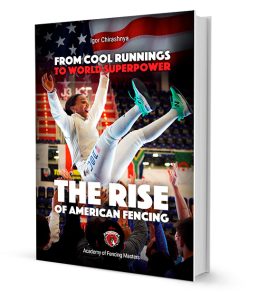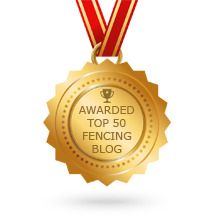
There is a widely held misconception that training is preparation for becoming a master in fencing. We come into lessons every week and we work with our coaches in an attempt to learn and grow so that we can perform well in competition because the competition is the really important thing. Or is it? Is competition the most important factor in pushing forward towards mastery for a fencer, or is there something else that drives us?
Exploring this idea of what it means to practice and what it means to perform is central to understanding what is behind fencing as a discipline. There is no professional version of our sport as such, but we do have something akin in our international competitors. In terms of drive, skill, and dedication, those individuals would be our goal. However, imitation is not really what we’re looking for either. You can’t become a master of any sport by simply chasing the shadow of someone else. There are other factors because every fencer has to find their own way.
Defining mastery
Training is mastery.
That’s not the expected answer is it? (though it’s the title of this blog!) We generally think of mastery as being when you win an Olympic Gold or when you are the coach of high ranking fencers. We think of mastery as being that old maestro who saw glory days in competition decades ago and now pushes young fencers to move faster and strike with more precision. We might think of mastery as getting that A rating.
Mastery has nothing to do with what you have done in the past. It has nothing to do with the rank that you got or the number of podium finishes you’ve made it to.
Every single time a fencer picks up their foil, their epee, or their saber, they are capable of being a master of the sport. Whether they are doing that in the context of the Olympic final, in the context of Summer Nationals, in the context of their group lesson, or even in the context of their own home when they are practicing with no one around. If you pick up that sword for any reason, you are a master. It does not matter your skill level as long as you bring the right things to the moment. Mastery is a skill.
Mastery is about moving yourself towards your best self. That ultimate version of yourself does not actually exist, because once you get to the end and you learn all the techniques and are able to execute them all perfectly, there will always be more techniques to learn. It does not ever stop. There is always a next thing, no matter how amazing you become as a fencer. The ultimate version of yourself is a carrot that you place out in front of you to push forward and further, always with the understanding that it is in the reaching for that goal that the mastery exists. We must keep on reaching. It’s certainly a strange thing to think about, this notion that mastery exists in an unreachable place, but it’s the only way to be truthful about it.
The greatest fencer of all time is no more a master than the newest fencer if the newest fencer has a mindset that lends them toward growth. GROWTH is mastery, not skill level.
As fencers, we have to learn to own that we are able to tap into our best selves in every moment. It is not a question of whether we can live up to our potential, it is only a question of whether we are willing to put ourselves into the right kind of mindset whenever we put on the fencing mask and step up to the piste. No matter the occasion.
Commitment without aspiration
We commit to our training, every day. We do this without thinking about the future and worry about what our performance will be when the day comes. The commitment has to be to the training, not to the outcome. That might seem strange because we are always talking about goals and the importance of planning for those goals, but training has to be an end in an of itself.
If you read at all about self-development, one very common exercise that you’ll come across is to answer the question “What is your why?” This is a central concept because if you cannot know why you are doing something, well then it is nearly impossible for you to make it through the process. If your “why” as a fencer is focused on outcomes that you cannot control, i.e. the result of a competition that will take place in some unknown future, then you are unlikely to sustain your efforts in daily training. Training is where your time is spent as a fencer, not competition.
Here’s a great example. I cannot write this blog with the thought of how many people will read it or how many shares it will get on social media (or if any). If I do that, then the message is lost and the soul of the work is not there. People take note, and I will eventually run out of steam in writing blogs. My “why” has got to be the writing itself. My readers and their needs, the community, these things factor into the content, but the writing itself is what matters. I have to enjoy the writing, otherwise, I cannot sustain the practice of blogging.
Fencing is the same. The “why” of a fencer has to be centered on their training. The amount of time that a fencer, even a highly competitive fencer at the international level, actually spends in competition on the strip is minuscule compared to the amount of time that they spend training with their coach. If you are holding on for that tiny sliver of experience when you are standing on the podium, well that is just not a lot to hold onto.
Dropping into the experience of training, this is where the great athletes are successful. Here are some facets of this concept.
- Full immersion in training at every opportunity
- Lifelong commitment to training
- Practice is the only thing that matters
- Satisfaction comes in growth
- Craving the training experience (most of the time at least)
- Gratitude for the support people – coach, opponent, club, referee, family
- Fun in fencing
Notice what all of those things have in common? None of them is about the outcome. They are only about the experience of training in fencing. What’s missing?
Winning. Losing. Touches. Points. Medals. Podiums.
These are not the important things in fencing. We are committed to our daily training, not aspiring to a goal that is far off and thus not real. What is real is what is right here in front of us. Nothing else matters.
Fencing is a sport of constant and thoughtful engagement. We are challenged to be in the moment, no matter where that moment is. This is where mastery is, in each twist of the blade and each step of footwork, no matter whether we are practicing alone in our room during a pandemic or on the stage of the World Championships.




Even after 50+ years fencing, I’m still training – especially new techniques as fencing evolves. After months of COVID isolation, I have to build back my fluidity and stamina. With national competition an uncertainty and thus team qualification, as well as regionals for my classification and age being limited, training *has* to be my “why.”
Hi R, Thank you as usual for your insights! Yes, current restrictions forced us to rethink our “why’s”. I have an idea – as a veteran fencer, competitor and referee, you have tons of observations in many areas. Wouldn’t you be willing to write a blog post and I will be delighted to publish it here. I believe many people, fencers and their parents, will find it inspirational.
Thank you for the invitation. Not into blogging. Currently investing energy into scholastic fencing. Yesterday I caught members of both teams without plastrons, and one team tried presenting two left-handers with right-handed jackets. If you want to interview me…
Great idea – will do! Look into your inbox for an email from me.